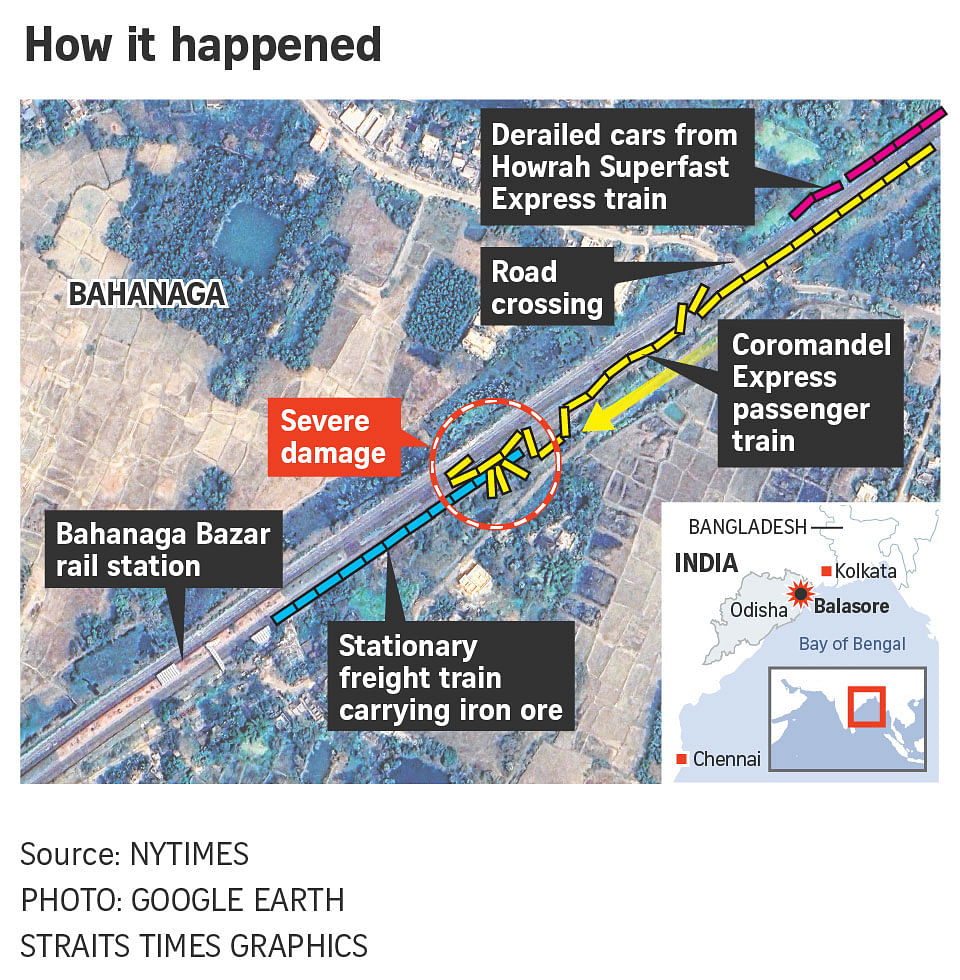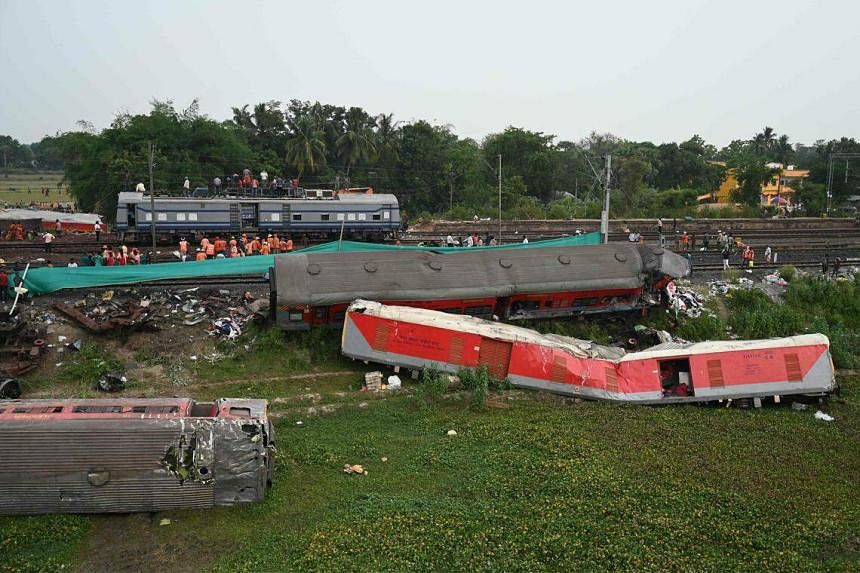BENGALURU - An official probe into one of India’s deadliest train crashes was announced on Monday, while rail services resumed in Odisha state as rescue operations came to an end following the three-train crash on Friday.
India’s Railway Board, the top executive body, has recommended that the Central Bureau of Investigation, the country’s federal criminal investigative agency, handle the probe into the cause of the disaster, which killed 275 and injured more than 1,000 people.
Working rapidly on Sunday in heat over 37 deg C, rescue workers searched for survivors and cleared the overturned train cars from the tracks so that crucial rail services could restart.
In the meantime, family members continued their desperate search for missing loved ones.
Even after rescue workers ceased work on Sunday at the accident site in Balasore, relatives and locals continued to search the rubble for bodies, or at nearby morgues, hoping to find out what had become of their relatives.
The first few cars of the Coromandel Express, which travels between Chennai in south India and Howrah in the east, derailed at 7pm in the Bahanaga Bazar station when it hit a stationary freight train. The passenger coaches that derailed on the adjacent tracks were then hit by the Howrah Superfast Express coming from Bengaluru, travelling in the opposite direction.
Mr Deepak Behera, 37, who was playing football within earshot of the crash, told local news channels that for a moment, he thought the crash “was an earthquake”. He said he helped pull out at least 28 people from the overturned carriages.
About 3,500 passengers were believed to have been on board, and given the distance the trains were travelling (almost 1,700km), they came from across India.
Mr Moinuddin Sheikh travelled 300km by bus from Canning in West Bengal to the accident site looking for his missing friends. At a 40,000 sq ft air-conditioned exhibition hall in Balasore, he found the bodies of five of 13 young men from his village who were on board the Coromandel Express. The bodies were in bags, numbered and covered with white sheets.
As hospitals and morgues in Balasore were overwhelmed by the sheer number of dead, the North Orissa Chamber of Commerce and Industry let the state authorities use an exhibition hall in its business park to keep the bodies on blocks of ice.
To spare families the anguish of looking through each body bag, the authorities posted photographs of the dead on the Odisha state government website.
Senior doctors as well as specialised equipment and medicines have been flown in from the capital, New Delhi, to help attend to the injured, of whom more than 100 need critical care, said Health Minister Mansukh Mandaviya.
Indian Railway Minister Ashwini Vaishnaw announced a payment of one million rupees (S$16,350) to the families of the dead, 200,000 rupees to the critically injured and 50,000 rupees to those who suffered minor injuries.
Prime Minister Narendra Modi has also announced an additional compensation of 200,000 rupees to the kin of the dead and 50,000 rupees to the injured from the Prime Minister’s National Relief Fund.
Odisha’s chief minister Naveen Patnaik announced 500,000 rupees in compensation to the next of kin of those who died and 100,000 rupees to people who suffered serious injuries.
Amid nationwide calls for his resignation, Mr Vaishnaw said: “The root cause of the accident has been identified... It happened due to a change in electronic interlocking. Right now, our focus is on restoration. Whoever did it and how it happened will be found out after a proper investigation.”
Electronic interlocking is a modern technology that supervises and controls train movements.
Railways ministry official Jaya Varma Sinha said a signal was given to the Coromandel Express to run on the main track line, but the signal later changed, making the train enter an adjacent loop line where it rammed into the stationary freight train which was carrying iron ore.

Mr Vaishnaw denied that the accident had anything to do with the slow roll-out of India’s anti-collision technology – which opposition leaders and some railway experts suggested might have precipitated the accident.
Meanwhile, some users on social media presented the train accident as a premeditated attack carried out by Muslims. One handle @randomsena shared images of the train accident claiming that a mosque was located nearby. The caption said: “Just Saying Yesterday Was Friday.”
Fact-checking websites said the building was in fact a Hindu temple. The Odisha police issued a warning: “We appeal to all concerned to desist from circulating such false and ill-motivated posts. Severe legal action will be initiated against those who are trying to create communal disharmony by spreading rumours.”


